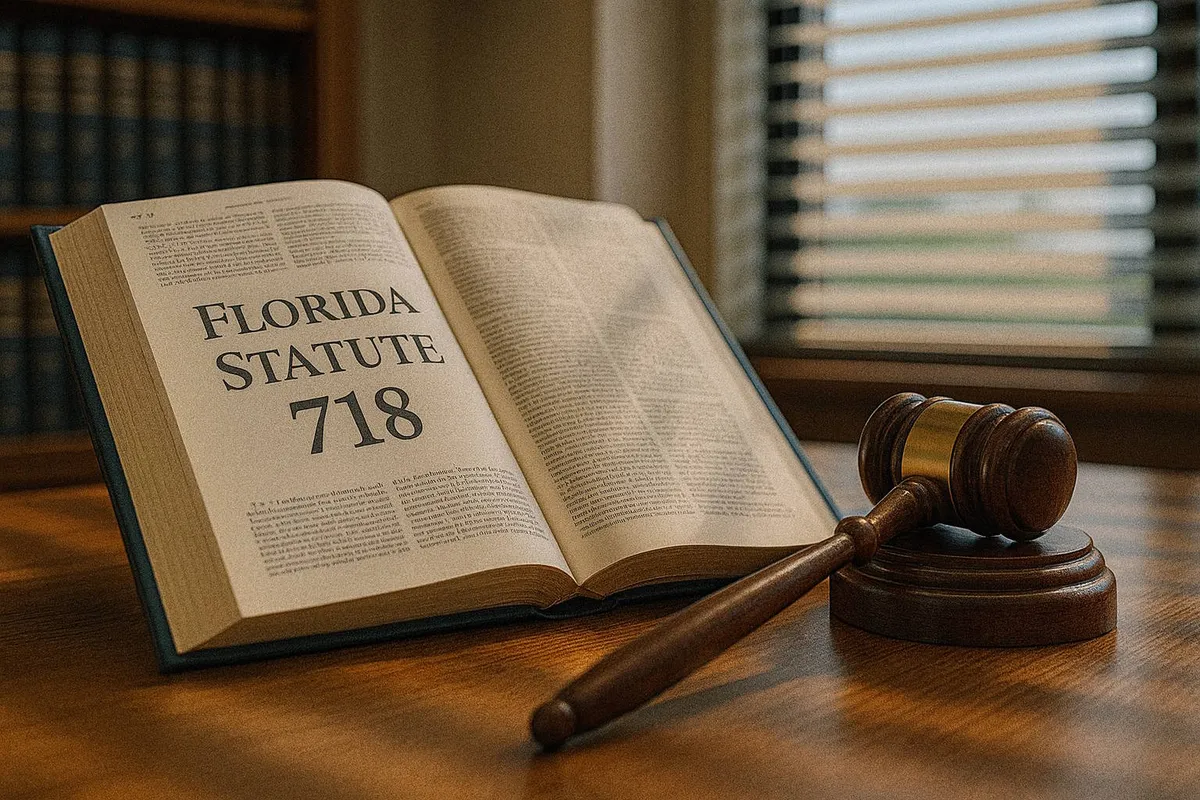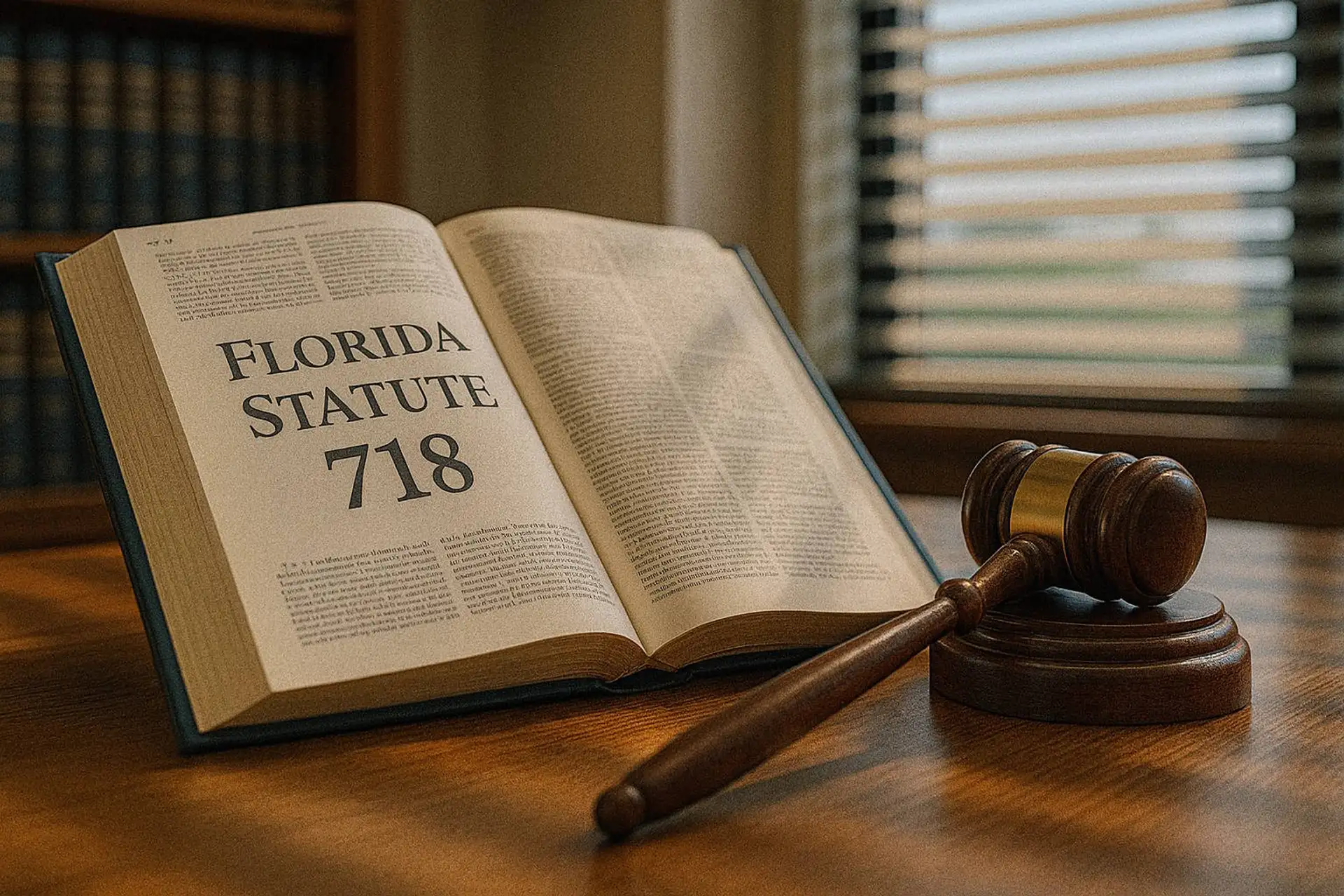Florida Statute 718 Explained: What Condo Boards Must Know in 2025
July 7, 2025

Florida Statute 718 Explained: What Condo Boards Must Know in 2025
Table of Contents
- What Is Florida Statute 718?
- Key Obligations for Condo Boards in 2025
- How Recent Amendments (Like HB 913) Change the Game
- Best Practices for Statute Compliance
- Final Thoughts
What Is Florida Statute 718?
Florida Statute 718, often called the Condominium Act, is the primary legal framework that governs the formation, operation, and responsibilities of condo associations in the state.
It outlines everything from:
- Board member duties
- Owner voting rights
- Budgeting and reserves
- Maintenance responsibilities
- Official records and transparency rules
Understanding this statute is essential. Boards that ignore it open themselves to DBPR complaints, lawsuits, and even personal liability.
“Statute 718 places the legal burden for compliance on the association and its board of directors, regardless of third-party involvement.”
— The Florida Senate - Chapter 718 Overview
Key Obligations for Condo Boards in 2025
📂 Official Records (§718.111)
- Boards must maintain and make accessible a wide range of documents, including meeting minutes, financials, reserve studies, and contracts.
- Records must be available within 10 working days of a written request from a unit owner.
🗳 Meetings and Voting (§718.112)
- Notice of meetings must be posted at least 48 hours in advance, with agendas attached.
- Electronic voting must meet specific authentication rules and be auditable.
🧾 Budgets and Reserves
- Boards must provide a proposed budget to owners before the start of each fiscal year.
- Recent legislative updates require stricter adherence to fully funded reserves unless a proper vote waives that requirement.
🎥 Virtual Meetings and Recordings
- If a board conducts virtual meetings, recordings must be posted and retained for at least 12 months (per HB 913).
How Recent Amendments (Like HB 913) Change the Game
While Statute 718 is the foundation, annual amendments add layers of new obligations.
🧠 HB 913 (2024)
- Requires the posting of meeting minutes and video recordings to a digital portal accessible to all owners.
- Enforces deadlines on notices, agendas, and transparency workflows.
- Introduces audit log requirements for compliance traceability.
📅 Other 2025 Changes
- Increased penalties for failure to respond to owner record requests.
- Clarified fiduciary responsibilities for directors and CAMs.
“Every board member should review updated statutes annually to ensure they remain in compliance with the evolving legal landscape.”
— The Florida Bar: Board Member Legal Duties
Best Practices for Statute Compliance
✅ Use Plain-English Summaries
Distribute digestible breakdowns of Statute 718 and HB 913 to new and existing board members.
✅ Align Meetings With Legal Milestones
Use your board’s calendar to plan key events like:
- Budget approvals
- Annual meetings
- Reserve votes
- Notice deadlines
✅ Automate Documentation
Use tools that:
- Timestamp notice postings
- Track vote outcomes
- Archive meeting videos and minutes automatically
📘 Want a visual walkthrough of the key statute sections your board must follow?
👉 Learn What HB 913 Requires →
Final Thoughts
Florida Statute 718 is not optional reading for board members — it’s the operating manual for every condo association in the state.
By understanding and implementing its core principles, your board can:
- Avoid DBPR enforcement
- Reduce owner disputes
- Build trust with your community
- Operate confidently and legally
👉 Start Your Free Trial →
CondoDataHost tracks deadlines, automates compliance, and embeds legal protections into every step of your board’s workflow.
Know the law. Follow the law. Simplify your board’s responsibilities — the smart way.

